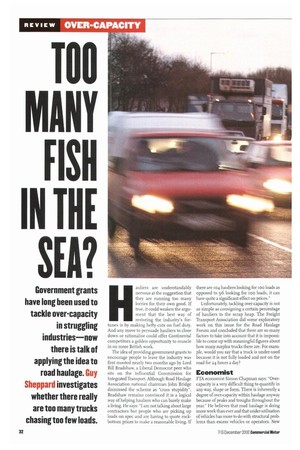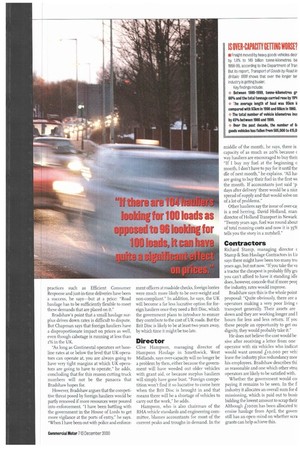TOO MANY FISH IN THE SEA?
Page 34

Page 35

If you've noticed an error in this article please click here to report it so we can fix it.
Government grants have long been used to tackle over-capacity in struggling industries—now there is talk of applying the idea to road haulage. Guy Sheppard investigates whether there really are too many trucks chasing too few loads. H auliers are understandably
nervous at the suggestion that they are running too many lorries for their own good. If true, it could weaken the argument that the best way of restoring the industry's for tunes is by making hefty cuts on fuel duty. And any move to persuade hauliers to close down or rationalise could offer Continental competitors a golden opportunity to muscle in on more British work.
The idea of providing government grants to encourage people to leave the industry was first mooted nearly two months ago by Lord Bill Bradshaw, a Liberal Democrat peer who sits on the influential Commission for Integrated Transport. Although Road Haulage Association national chairman John Bridge dismissed the scheme as "crass stupidity", Bradshaw remains convinced it is a logical way of helping hauliers who can barely make a living. He says: "I am not talking about large contractors but people who are picking up loads on spec and are having to quote rockbottom prices to make a reasonable living. If
there are1o4 hauliers looking for Ioo loads as opposed to 96 looking for too loads, it can have quite a significant effect on prices."
Unfortunately, tackling over-capacity is not as simple as consigning a certain percentage of hauliers to the scrap heap. The Freight Transport Association did some exploratory work on this issue for the Road Haulage Forum and concluded that there are so many factors to take into account that it is impossible to come up with meaningful figures about how many surplus trucks there are. For example, would you say that a truck is under-used because it is not fully loaded and not on the road for 24 hours a day?
Economist
FIA economist Simon Chapman says: "Overcapacity is a very difficult thing to quantify in any way, shape or form. There is inherently a degree of over-capacity within haulage anyway because of peaks and troughs throughout the year." He believes that road haulage is doing more work than ever and that under-utilisation of vehicles has more to do with structural problems than excess vehicles or operators. New
practices such as Efficient Consumer Response and just-in-time deliveries have been a success, he says—but at a price: "Road haulage has to be sufficiently flexible to meet these demands that are placed on it."
Bradshaw's point that a small haulage surplus drives down rates is difficult to dispute. But Chapman says that foreign hauliers have a disproportionate impact on prices as well, even though cabotage is running at less than t% in the UK.
"As long as Continental operators set baseline rates at or below the level that UK operators can operate at, you are always going to have very tight margins at which UK operators are going to have to operate," he adds, concluding that for this reason cutting truck numbers will not be the panacea that Bradshaw hopes for.
However, Bradshaw argues that the competitive threat posed by foreign hauliers would be partly removed if more resources were poured into enforcement. "I have been battling with the government in the House of Lords to get more vigilance at the ports of entry," he says. "When I have been out with police and enforce
ment officers at roadside checks, foreign lorries were much more likely to be over-weight and non-compliant." In addition, he says, the UK will become a far less lucrative option for foreign hauliers once they need a Brit Disc, which the government plans to introduce to ensure they contribute to the cost of UK roads. But the Brit Disc is likely to be at least two years away, by which time it might be too late.
Director
Clive Hampson, managing director of Hampson Haulage in Smethwick, West Midlands, says over-capacity will no longer be a problem by then, either because the government will have weeded out older vehicles with grant aid, or because surplus hauliers will simply have gone bust. "Foreign competition won't find it so lucrative to come here when the Brit Disc is brought in and that means there will be a shortage of vehicles to carry out the work," he adds.
Hampson, who is also chairman of the RHA vehicle standards and engineering committee, blames accountants for most of the current peaks and troughs in demand. In the
middle of the month, he says, there is capacity of as much as 2096 because c way hauliers are encouraged to buy theii "If I buy my fuel at the beginning c month, I don't have to pay for it until the dle of next month," he explains. "All hai are going to buy their fuel in the first wt the month. If accountants just said 'p days after delivery' there would be a nice spread of supply and that would solve on of a lot of problems."
Other hauliers say the issue of over-cal is a red herring. David Holland, mart director of Holland Transport in Newark "Twenty years ago, fuel was round about of total running costs and now it is 35°A tells you the story in a nutshell."
Contractors
Richard Stamp, managing director c Stamp 8c Son Haulage Contractors in Lii says there might have been too many tru years ago, but not now. "If you take the va a tractor the cheapest is probably fifty gra you can't afford to have it standing idle does, however, concede that if more peof the industry, rates would improve.
Bradshaw says this is the whole point proposal: "Quite obviously, there are a operators making a very poor living t transport generally. Their assets are down and they are working longer and 1 hours for less and less return. If you these people an opportunity to get ou dignity, they would probably take it."
He does not believe the cost would be sive after receiving a letter from one operator with six vehicles who inclicai would want around Lio,000 per veil: leave the industry plus redundancy mor his employees. Bradshaw describes thi as reasonable and one which other stru; operators are likely to be satisfied with.
Whether the government would co: paying it remains to be seen. In the f industry it allocates an overall sum ford missioning, which is paid out to busit bidding the lowest amount to scrap their Although lioom has been allocated tc ernise haulage from April, the govert still has an open mind on whether scra grants can help achieve this.








































































































